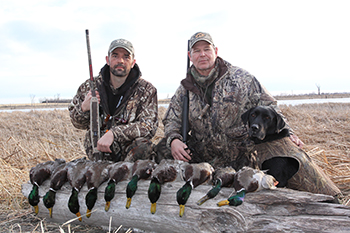Each year we provide a “season summary” for the magazine, which requires sending some of our regular contributors and a few notable hunters a survey, asking them to summarize their season past. In addition, we do a bit of research of our own by dissecting some of the online comments posted on websites and chat rooms during the season past.
The danger of the online investigation is, obviously, that one may run across half-truths and outright lies. This is the Internet after all, and contributors to some of these sites may not be required to identify themselves, other than perhaps offering a clever chat room nickname.
That being the case, it’s often more reliable to look for the “honest” reports. But how would one know that a report is honest? We have a theory. The hunters who are completely frustrated never lie. If Joker911 says his group has been hunting for four days and shot two ducks, you can be pretty sure this is absolutely accurate. When someone says the hunting has been “terrible,” it’s got to be true. No one lies or exaggerates about laying a goose egg.
Want to see WHEN the birds showed up? Don’t believe just a single, stand-alone comment. If there were birds around, more than one guy would likely be talking about it. Go through the days of comments and watch as the remarks become more positive. You can almost map the migration by these comments because multiple commentors will start chipping in with the good news. If a solo poster is the only one who “slaughtered” them, he’s either fibbing or lying through his teeth—your choice.
One of the comments we have had trouble with on the DU site is “incoming.” DU offers the poster the opportunity to report an “Activity Level,” presumably the activity level of the ducks, not the hunters (although in some areas activity level of the hunters would be helpful).
would be helpful).
Years back, when we first saw the word “incoming” in a report, we thought it was positive. But as we saw it more and more, we wondered why the posters all used that same phrase, especially after saying that there were few ducks in the area. Were there actually birds INCOMING? How did they know?
As it turns out “Activity Level” choices, tend to put words in people’s mouths, so to speak. “Incoming Low Numbers” being the lowest descriptor available. In our research we learned to avoid the “Incoming Low Numbers” altogether because it seemed like “incoming” became a pseudonym for what the poster really wanted to say, which was “low numbers” or perhaps something even more descriptive like “zilch” or “zero.”
But “incoming” definitely sounded better than some of the descriptive words everyday duck hunters might be tempted to use when the hunting is bad.
In DU’s favor, they have modified their “Migration Map” site and, of late, the posters have become more descriptive in explaining the status of waterfowl in their areas. It definitely can be a useful tool.
We wish you all the best in the new fall season. May you truly have INCOMING ducks and geese.
